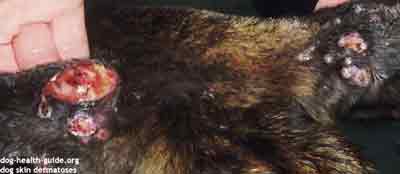Overview
A bacterial dog skin infection is usually caused by some underlying disease or Staphylococcus intermedius which is a bacteria that infects canine skin. Pyoderma is characterized as being superficial, or only affecting the top layer of skin, or "deep" involving lower layers of the skin.
Dog skin pimples that are the result of a bacterial skin infection are called pustules (filled with pus) or papules (raised pimples on the skin).
There is an above average incidence in German Shepherds and short coated dogs with skin folds.

Source: Pfizer
Causes
Causes of bacterial skin infections in dogs include:
- Broken skin or injury from scratching, trauma or grooming
- Foreign body under the skin
- Impaired circulation
- Immune system problems
- Change in bacterial flora
- Prolonged skin exposure to moisture (such as in dogs with skin folds)
- Hormonal disorders (hypothyroidism)
- Forunculosis (formation of boils)
Symptoms
Symptoms of infection include skin pimples (pus filled, hard), crusted skin, seborrhea (dandruff) and alopecia (hair loss) on legs.
Diagnosis
A skin scraping is used for further evaluation under a microscope. For pimples sometimes a needle is used to collect skin material (aspiration of nodules). The veterinarian will need to differentiate a bacterial infection from other possible causes such as allergy (atopy/seasonal, food, fleas),
Treatment
Antibiotics are used for a minimum of 7 to 10 days. Anti-bacterial prescription anti-biotics and shampoos that contain Chlorhexidine such as Duoxo are used to treat skin infections. Routine use of shampoos may help dogs that have a recurring problem. A topical applied to the skin that contains benzoyl peroxide (2%) could also be of benefit.
Whirlpool baths can help to drain wounds and remove skin debris. Dogs should be on a high quality AAFCO approved diet.
If lesions don't heal properly or if they frequently reoccur, bring them to the attention of a veterinarian for further investigation and to check for diseases such as hypothyroidism.
References Dog Skin Infection:
Source: R.S. Mueller, Department of Clinical Sciences, College of Veterinary Medicine and Biomedical Sciences
Colorado State University
Researched by: Jeff Grill
